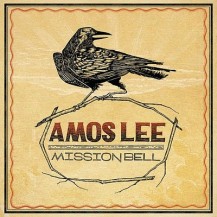Amos Lee’s “Mission Bell”
“Amos Lee fans, I think you’ll either love this album or turn it off and play an old one instead.” -BY
Beth Yeckley
7.4
out of 10
Amos Lee
Mission Bell
January 21, 2011
Blue Note Records
Amos Lee releases his fourth full-length album, Mission Bell, to the sound of… well, most likely, nothing. Everyone is sleeping, completely relaxed, in the fetal position somewhere dreaming about pretty sunsets, and—Ok, I’ll stop.
Don’t get me wrong, Lee’s honeyed crooning is still faithful, his loss is apparent (and works in his favor), and the languid expression of his songs continues to be a product of that bluesy charm he wears on his sleeve—it’s easy to picture Lee as the thoughtful silhouette standing against beautiful backdrops across the country. But where it was easier to relate to the soulful trials and honest yearning of his previous albums, Mission Bell is a lean addition to his repertoire. The most notable aspects of the new album are the guest appearances, including Willie Nelson on “Behind Me Now / El Camino Reprise” and Lucinda Williams on “Clear Blue Eyes.” And the inspired turn towards a mix of blues and country nods to Calexico’s musical backing and production (Joey Burns).
I loved Lee’s self-titled debut in 2005, and his follow up albums (Supply and Demand and Last Days At the Lodge) only served to build my affections for his sound and his voice. Lee always stood out from other singer/songwriters bringing hints of gospel and blues to his folk acoustic approach. I can’t say that Mission Bell is not classic Lee, because in various respects, it is; the songs are smooth and well-polished, but seem to be shaved a little thin on soul (think back to “Soul Suckers,” “Love In The Lies,” “Baby I Want You”) and energy (think back to “Truth,” “Give It Up,” and “Listen”).
“Jesus” is the most incredible song on the album, written about Lee’s grandfather’s passing away, and constructed of bluesy instrumentation, haunting and entrancing with great percussive notes. “Windows Are Rolled Down” feels like classic Lee with the pairing of his vocals and the acoustic guitar at the forefront, and “Flower” feels a little more progressive and lightweight, but is a nice addition to the album. Amos Lee fans, I think you’ll either love this album or turn it off and play an old one instead.
